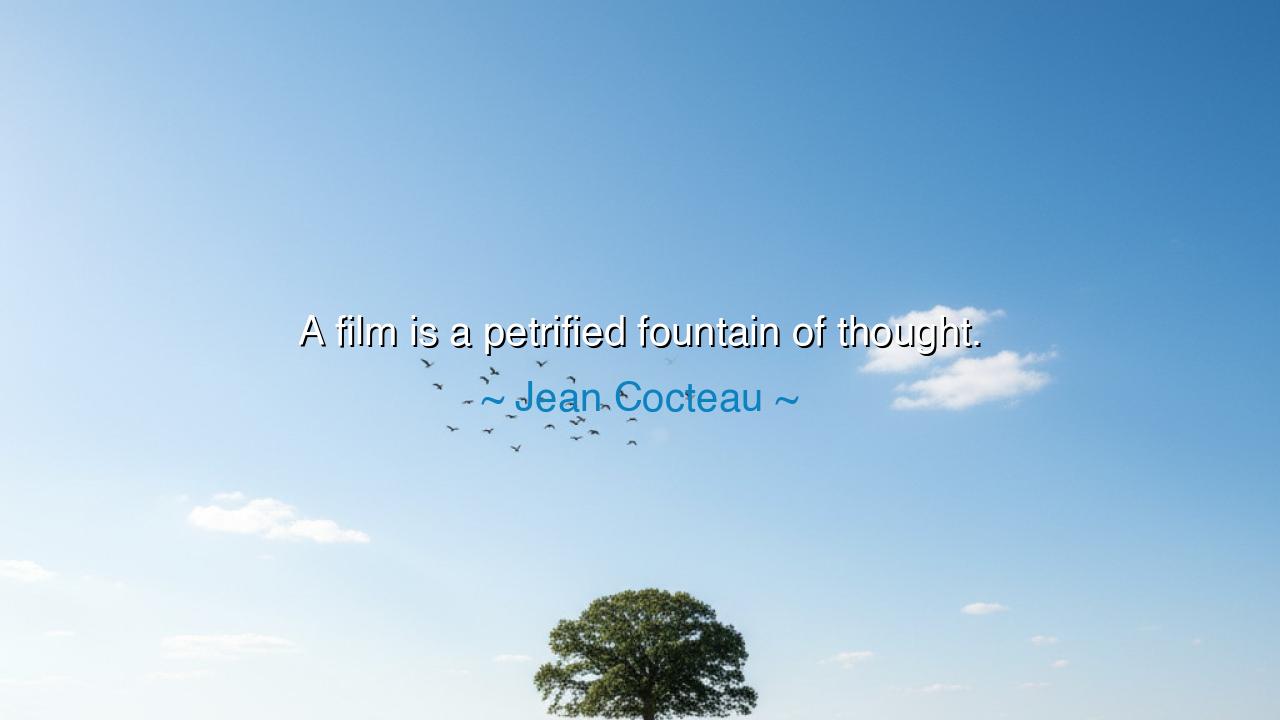
A film is a petrified fountain of thought.






"A film is a petrified fountain of thought." These profound words by Jean Cocteau offer us a glimpse into the very nature of cinema and the power of the mind to shape reality. Cocteau likens the film to a fountain, a vibrant, flowing force of ideas and emotions, yet one that has been frozen in time, forever captured. In this metaphor, a film is not merely a static representation of images, but a living manifestation of thought, crystallized for all to witness. It embodies the transitory nature of human consciousness, the ebb and flow of emotions and ideas, but rendered permanent, fixed in the frame of celluloid or digital code.
In the ancient world, the nature of thought was often seen as a fluid and dynamic force. The Greeks, especially Plato, regarded ideas as living entities, capable of transforming and shaping the world around them. But these thoughts were ephemeral, like rivers, flowing only for a moment before fading away. What Cocteau captures in his quote is the essence of cinema as a method to preserve that fleeting moment. Just as the Greeks believed in the pursuit of wisdom through dialogue and contemplation, so does the filmmaker weave ideas into a tangible form that transcends the moment, creating a lasting, eternal impression. Cinema, in this sense, is the petrification of thought itself — a solid, enduring manifestation of the ideas and visions that once flowed freely.
Consider the example of the great epic poets like Homer, whose works — the Iliad and the Odyssey — were born from the living thought of a culture. These tales were passed down orally, their meanings shifting and evolving, much like water flowing through a stream. However, they were eventually captured in written form, frozen into the language of the scrolls, forever preserving the essence of those ancient thoughts. Homer's words became an immovable foundation upon which Western literature would build. In this way, films are not unlike the written works of ancient storytellers: they are preserved visions, a method of capturing the fountain of human thought, each frame an eternal reflection of a moment in time.
A more contemporary example of this idea can be seen in the works of Federico Fellini, whose films often felt like dreamscapes, surreal and full of emotion. Fellini’s masterpieces like 8½ or La Dolce Vita encapsulate the chaotic flow of thought — the personal and societal struggles, desires, and aspirations that fill the human mind. Yet, in the form of film, these thoughts were made permanent, frozen into sequences of images and sounds. The petrified fountain of thought that Cocteau speaks of becomes a mirror to the collective consciousness, a window into the universe of human emotion and intellect that is both fleeting and eternal.
This metaphor calls us to understand film not as just entertainment, but as a powerful artistic medium, one that captures the very essence of human thought. It is not merely about telling a story; it is about freezing a moment of human experience and making it available for contemplation across time. The great directors of cinema, like Cocteau himself, understood this profound connection between thought and imagery. Through their work, they sought not just to entertain, but to distill the flow of human consciousness into a form that would endure beyond the fleeting moment. Cinema, in its truest form, is the marriage of thought and vision, a marriage that endures even as the thoughts and emotions it reflects evolve.
The lesson from Cocteau’s words is clear: art, and specifically cinema, allows us to capture and preserve the very thoughts and feelings that define our existence. Just as a river flows only once, the moments of our lives pass by in a heartbeat. But in film, those moments are preserved, frozen in time, so that they may be experienced and reflected upon again and again. It is a reminder to us all that the ideas we hold — the thoughts, emotions, and experiences that define who we are — can be immortalized, shaping future generations long after we are gone.
So, let us not view film as mere entertainment but as a vessel of thought, a means to share and preserve our deepest ideas, emotions, and stories. As creators and as consumers of this art, we should approach film with the respect it deserves, recognizing that it is not just the petrification of images, but the preservation of ideas that have the power to shape the world. In this, we find the legacy of Cocteau’s wisdom: that the fountain of thought, once captured, can flow through eternity, touching the hearts and minds of all who dare to witness it.






AAdministratorAdministrator
Welcome, honored guests. Please leave a comment, we will respond soon